20+ SAMPLE Individual Service Plan
-
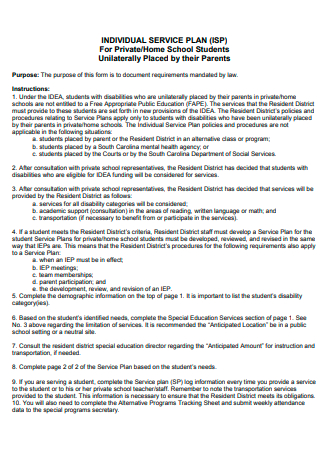
Individual Service Plan Template
download now -
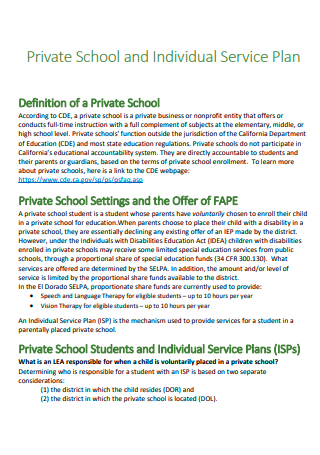
Private School and Individual Service Plan
download now -
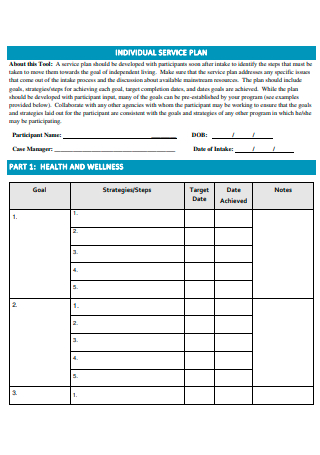
Formal Individual Service Plan
download now -
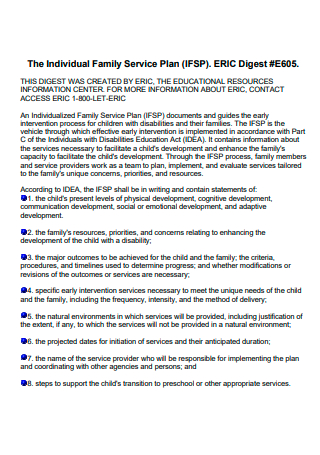
Individual Family Service Plan
download now -
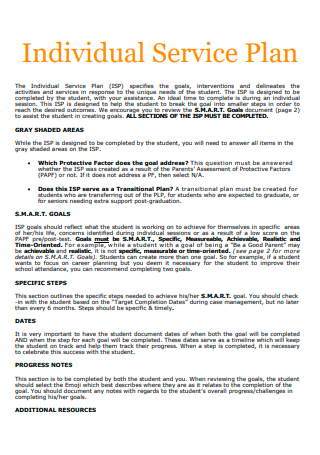
Individual Service Plan Example
download now -
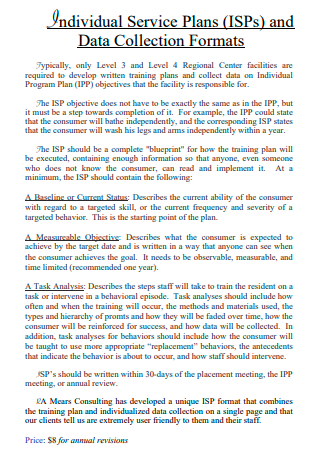
Individual Service Plans and Data Collection Format
download now -
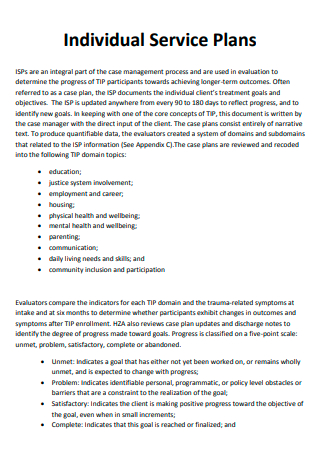
Individual Service Plan in PDF
download now -
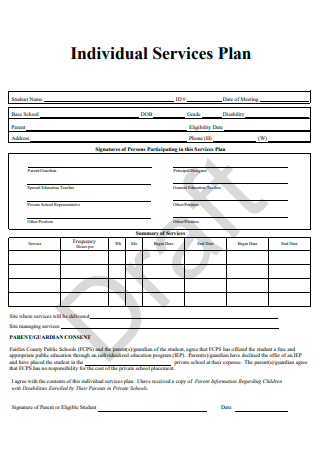
Draft Individual Service Plan
download now -
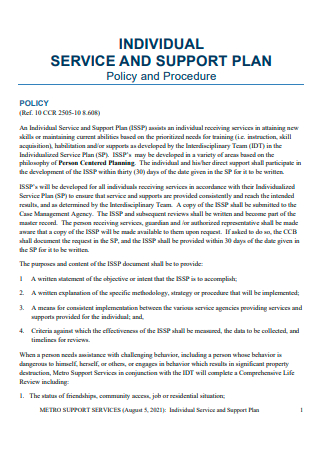
Individual Service and Support Plan
download now -
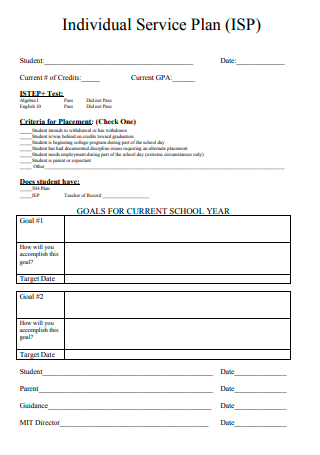
Simple Individual Service Plan
download now -
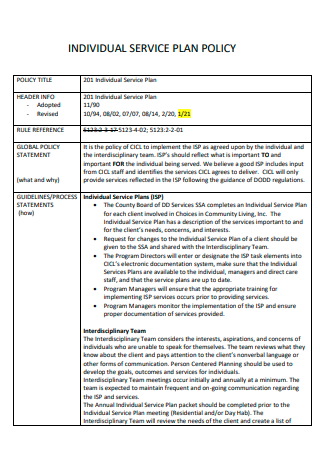
Individual Service Plan Policy
download now -
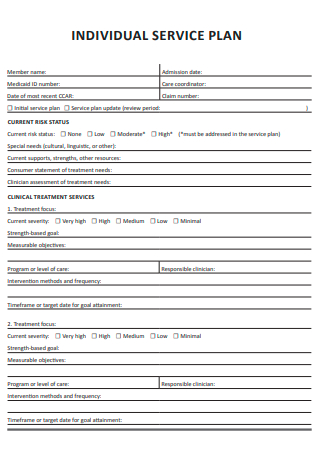
Basic Individual Service Plan
download now -
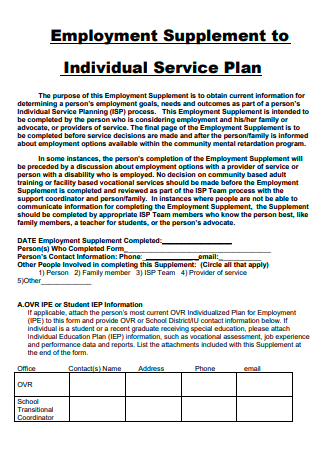
Employment to Individual Service Plan
download now -
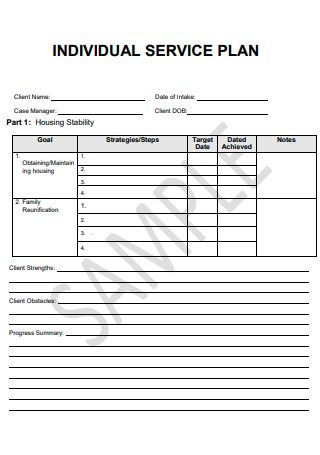
Sample Individual Service Plan
download now -
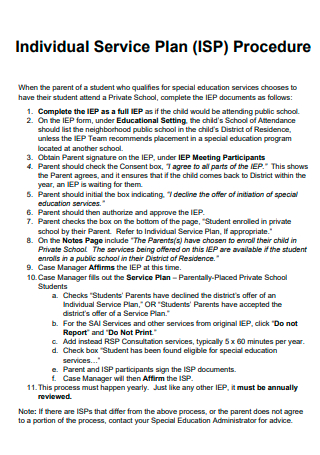
Individual Service Plan Procedure
download now -
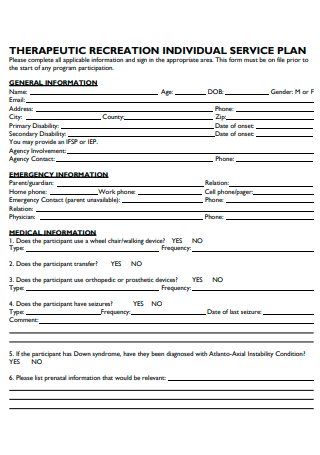
Recreation Individual Service Plan
download now -
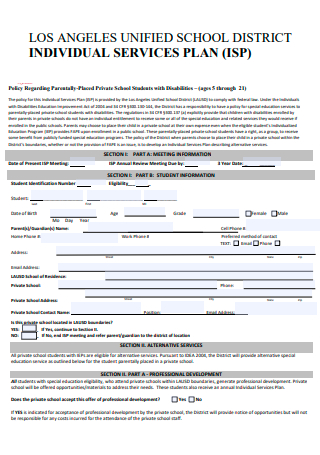
School District Individual Service Plan
download now -
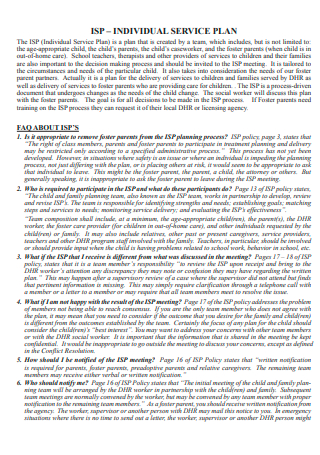
Standard Individual Service Plan
download now -
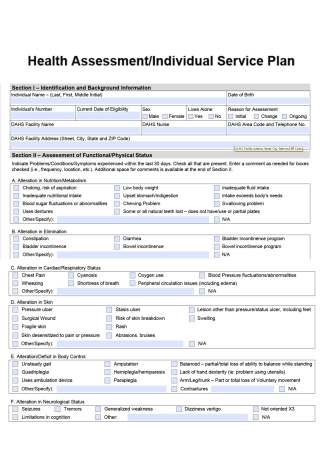
Health Assessment Individual Service Plan
download now -
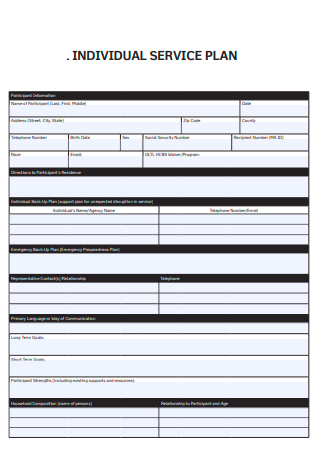
Printable Individual Service Plan
download now -
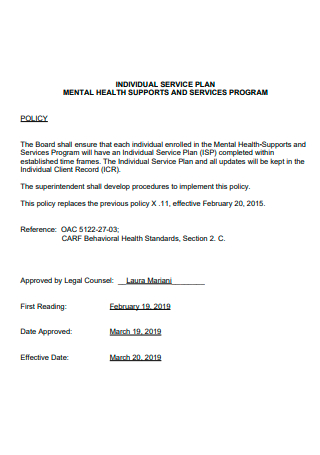
Mental Health Support Individual Service Plan
download now
FREE Individual Service Plan s to Download
20+ SAMPLE Individual Service Plan
What is an Individual Service Plan?
Different Types of Individual Service Plans
Basic Components of an Individual Service Plan
How to Write an Individual Service Plan
FAQs
What does ISP assessment means?
What is the difference between individual service plan and individual education plan?
What are some examples of individual service plans?
How to prepare an individual development plan?
What is an Individual Service Plan?
An individual service plan is a comprehensive and well-structured document that is used to outline the major goals, objectives, desired outcomes, needs, and preferences of a person. Case managers use this planning tool to diagnose or assess the needs of the individual and evaluate and monitor the identified services. It is mostly used in academic, health, and social work settings, for example, special education, mental health, and physical rehabilitation. Professionals in these different sectors determine the effective approach and strategies to help and guide the individual for development and progress.
According to a published medical and science research report by Wiley Online Library, 42.6% of the individual service and support plan goals were associated with resources from specialized services, 31.5% related with natural resources, and 25.9% linked with a combination of both natural and specialized services. Thus, all kinds of health care specialists or medical workers, behavioral therapists, educators, school teachers, academic supervisors, project managers, family counselors, mental health specialists, community social workers, and other professionals who provide different kinds of individualized and specialized services should effectively create a compelling and well-written individual service plan.
Different Types of Individual Service Plans
It is integral that you fully understand the different types of individual service plans that you and other healthcare workers, educators, behavioral therapists, community service social workers, and other professionals will use. This will help you to be aware and informed about the fundamental aspects of providing quality services for individuals to assess their needs and resolve their issues.
1. Individual Family Service Plan
An individual family service plan or IFSP is a blueprint developed by a team which is consists of professionals and the child’s parents to assess the needs of the child with special needs. Most governments encourage their states, regions, and cities to set up seamless systems developed to serve children. The development of this plan focuses on functional outcomes, as well as it discusses the strengths and needs of the child, goals the family want for their child, and individualized services that would best meet those needs. The major components of IFSP are the current levels of development, the family information including resources, concerns, and priorities, measurable outcomes, services that will be given, the environment in which services will happen, and the names who will be responsible for paying services, and the transition plan.
2. Individual Service and Support Plan
Construct an individual service and support plan (ISSP) to guide an individual in receiving services in acquiring new skills or maintaining existing abilities and skills based on the primary needs for training. It is prepared by the interdisciplinary team in wide-ranging areas according to the philosophy of person-centered planning. All individuals receiving services based on their individual service plan to make sure that service and supports are given consistently and attain the preferred results. The ISSP document provides a written statement of its objectives, a detailed explanation of the specific methodology, strategy or procedure, and criteria to measure the ISSP’s effectiveness.
3. Mental Health Support Individual Service Plan
Based on a recent statistical report by Mental Health America, 19.86% or approximately 50 million American adults are experiencing a mental illness and 4.91% of them are experiencing a severe mental illness. Make an individual service plan to provide mental health support for an individual who is suffering with a mild or severe mental illness. It contains a general information of the activities, resources, and services to assess and help an individual who has a mental illness.
4. Individual Service Plan for People with Developmental Disabilities
In the United States, there are more than 350,000 adults with intellectual or developmental disabilities and they have more than 110,000 assisted living arrangements. There are health experts and medical professionals who design individual service plans enforced by law to guide the provision of services for consumer and give the blueprint for organizinf the environment of the treatment. This plan involves the integration of wellness goals on ongoing basis as it encompasses the health and lifestyle of the individual, assessment procedures for the specification of the individual’s needs and priorities, staff instruction, and strategies for program and progress performance evaluation.
5. Case Management Individual Service Plan
A case management individual service plan is a crucial planning tool created by social workers when setting up a case for each new client as it assists the client and case manager, along with the case management team to provide concrete and proactive approach in addressing the needs of the client. Prepare this document by conducting an in-depth interview while using an interview analysis report, defining intermediate and long-term goals, structuring concurrent plans, and designing well-defined steps for implementation.
Basic Components of an Individual Service Plan
Several academic institutions and health facilities have their own guidelines and standards when creating an individual service plan. Take note of the basic components typically included in this document when you start making your individual service plan.
How to Write an Individual Service Plan
Designing a clear and engaging individual service plan can be challenging and overwhelming for new social workers or case management workers. If you are having a difficult time writing a systematic individual service improvement plan, we have some easy-to-follow tips that show how to write a clear and structured individual service plan.
Step 1: Create an Introduction
Write some basic or personal information of the individual who will receive the specialized services. Indicate the full name of the person, age, e-mail address, and other personal details that the person can provide. Also, add the name of the service provider and the facility or institution where the services will be given to the individual.
Step 2: Specify the Goals and Objectives
What are your specific goals and objectives for your individual service plan? Write in this section the specific, measurable achievable, realistic, and time-oriented or S.M.A.R.T. goals and objectives that will guide the individual in achieving his or her vision or preferences. The goals indicated in this plan must reflect what the person is currently working on. Create more than one goal for the individual service plan.
Step 3: Describe the Roles and Responsibilities of the Team
The next step is to write the description of the roles and responsibilities of the individual service management team. Inform your readers about the major duties and tasks of each of the team members. Point out their top skills and competencies, especially in providing solutions for the individual.
Step 4: Develop a Summary of the Activities and Methods
Make a summary outline of the specific activities and methods required to accomplish the S.M.A.R.T. goals and objectives. Check in with the individual based on the target completion dates during the case management. Be accurate, clear, specific and timely while explaining the defined steps and procedures for the plan.
Step 5: Set Dates and Add Progress Notes
Establish the target completion dates ofthe individual service plan. Specify the dates of when both the goals and objectives will be accomplished and when the step and procedure for each goal will be done. So, make a timeline to keep the idnivdual on track and assist them to track their progress. Record any notes like a mental health progress note regarding the overall progress and positive changes of the individual in reaching his or her goals and objectives.
Step 6: Proofread and Prepare the Individual Service Plan
Review your the entire content of the individual service plan and make sure that you fully incorporate all the key points in your plan. If you realize that you forget to include more fundamental details in a specific section or in several parts of the individual service plan, kindly do your best in proofreading, editing, and revising the document immediately.
FAQs
ISP assessment is a thorough assessment of an individiualized support plan in evaluating the personal abilities, competencies, needs, and skills of each person. It allows in idenitfying a person’s strengths and weaknesses.
What does ISP assessment means?
Individual service plan is a document extensively used for private school students while individual education plan is a document made for public school students. These documents explain the activities, tasks, and school resources required for a student to achieve personal academic goals.
What is the difference between individual service plan and individual education plan?
Some examples of individual service plans are individual family service plans, case management individual service plans, assisted living individual service plans, school individual service plans, social work individual service plans, behavioral developmental support individual service plans, mental health support individual service plans, and basic individual service and support plans.
What are some examples of individual service plans?
First, identify your professional goals you want to attain. Next, determine your strengths and limitations to know what you need to further improve. Describe your objectives. Then, implement your plan and continue creating goals for your performance development plan. Learn how to upgrade your abilities and skills. Look for more learning opportunities that are available for you and include them in your plan.
How to prepare an individual development plan?
Make sure that when writing your individual service plan, it is based on a comprehensive assessment of the person’s service needs. Whether you are offering services for mental health, physical therapy, or special education, a cohesive and well-coordinated individual service plan is a beneficial roadmap to help individuals achieve their personal goals and assess their needs effectively. We have included in our website individual service plan templates, formal individual service support templates, social work individual service plan templates, and other individual service for professional development plan templates that you can easily access, download and use for your work.
